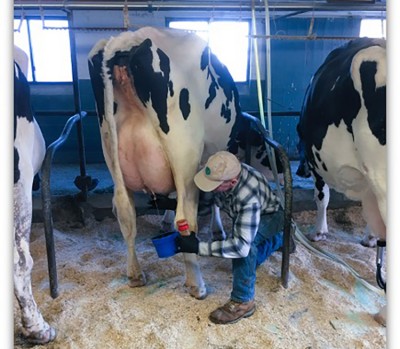Milk's most important contact surface by Abby Bauer

Milk's most important contact surface
BY ABBY BAUER, ASSOCIATE EDITOR
A combination of factors contributes to high-quality milk, but for New York dairy farmer Jim Davenport, he believes a low somatic cell count begins at the teat level.
"Milk quality issues inside the teat start with what's on the teat," he said. Davenport shared the strategies used on his farm in the March Hoard's Dairyman webinar, "Clean cows make clean milk."
Davenport's dairy is located near Ancramdale, N.Y., just two hours north of New York City. His herd of 70 registered Holsteins and a few registered Ayrshires averages 86 pounds of milk, with 4.1% fat and 3.2% protein. The cows are milked twice a day in their tie stall barn, and their average somatic cell count for 2020 was 33,583 cells per milliliter (mL).
The path to clean teats starts with clean cows. Their cows are housed on foam mats covered with kiln-dried pine sawdust, and the backs of the stalls are dusted with hydrated lime.
"We spend way too much on bedding but it does get us results," he shared. "The teat is always pretty clean, and that is the important part, as that is what contacts the milking machine."
They use a hoe to carefully clean stalls and pull back bedding several times a day. He said that gutter grates also help to keep cows' tails out of the manure and, in turn, maintain cleaner cows.
"Our goal is to attach milking units to perfectly clean teats," he said. "The teats should be as clean before the machine goes on as after."
When it comes to sanitizing the teats, Davenport emphasized the importance of giving dip a clean and dry teat dip to sanitize. He shared that his motto is, "Ask not what your teat dip can do for you, but what you can do for your teat dip."
He said they use a 0.5% iodine solution for pre- and postdipping, and they apply it generously. "The target is to cover every part of the teat that enters the milking liner," he said.
Davenport also credits a balanced ration as part of the milk quality equation. This includes high-quality forage and plenty of microbial protein.
"Try to get the right feed into the cow, try to keep them really clean, and honestly, I think that's most of the battle," Davenport said.
This commitment to producing high-quality milk has earned Davenport the National Mastitis Council's Platinum Award for milk quality six times, more than any other farm in the country. To learn more, listen to the March Hoard's Dairyman webinar, "Clean cows make clean milk." The webinar was sponsored by Ozolea.
To comment, email your remarks to intel@hoards.com.(c) Hoard's Dairyman Intel 2021March 15, 2021![]()
Upcoming Events
Crops, Cows & Critters - Southwest New York Dairy, Livestock & Field Crops Newsletter Sponsorship
December 19, 2025
Our two forms of publications feature research-based and timely information from our four specialists, listed to the right, along with local event notifications and Cornell University outreach. This information is provided to participants who range from dairy, livestock, and field crops producers to agricultural suppliers and consultants.
Weekly Email Update: Shared with 625+ households who have signed up with our program.
Monthly Paper Mailer: To reach our stakeholders and farmers who lack internet access, we send out a monthly mailer where your company's logo and contact information would be featured with a mailing list of 330+ households.
If you sponsor our weekly and monthly publications you reach approximately 955 households.
Visit our website to view our newsletters!
2025 Cornell Food Beverage & Animal Feed Manufacturer Survey
December 19, 2025
Industry and Educational Advocates for New York State's Food, Beverage, and Animal Feed Manufacturing industries:
As you know, NYS has a diverse food and beverage manufacturing industry, in both the types of industries that exist and the wide distribution of firms by scale. Many manufacturing firms have strong backward linkages to agricultural production sectors in the state that support both farm-level and downstream food industry firms and consumers. In collaboration with the New York State Department of Agriculture and Markets, a team from Cornell University's Charles H. Dyson School of Applied Economics and Management has recently rolled out the 2025 New York State Food, Beverage, and Animal Feed Manufacturer Survey. The industry will benefit from an updated assessment of the industry that informs private and public investments and opportunities to support firm growth and improved profitability.
Boots in the Barn: Cornell Dairy Research Updates
January 13, 2026
January 20, 2026
January 27, 2026
February 3, 2026
February 10, 2026
February 17, 2026
February 24, 2026
Join us for some or all!
Announcements
No announcements at this time.





